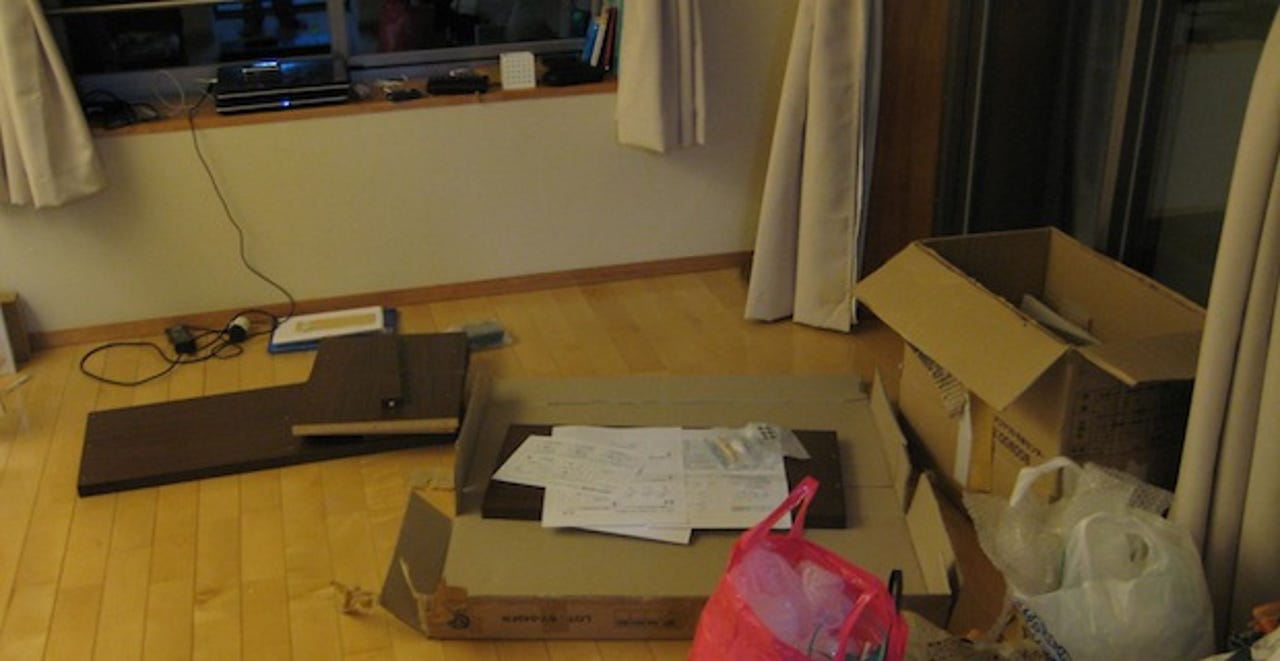Culture shock: Finding a small slice of Japan to call 'home'

Though it may seem fitting to the cultural stereotype, Japanese apartments are very small.
I lived in the country back in England where the landscape was green; full of trees, and roaming wildlife. I used to see deer in my garden, and despite my mothers loathing of them, I knew it was something one shouldn't take for granted.
My only home consisted of a small room that was mostly my bed. Even though I had prepared myself for what to expect here, by rigorously trawling apartments on the web, the preparation was clearly not enough.
As you know, I'd been trying to get on top of my essential lifelines whilst starting out in Japan. I was on my way to getting a phone and bank account, but I lacked the most basic of all essentials.
I needed somewhere to live.
Believe it or not this was actually one of the easier aspects of starting up in a foreign country, but that's partly because I took the easiest route. Although my partner and I were yet to own a phone yet, we were able to arrange some viewings via pay-phones and emails. We just had to go out and start looking at places.
In Japan, moving into a new home is far from cheap, and for foreigners it can be difficult. Most Japanese estate agencies will not talk to you. If they do, you will all but certainly require a third-party guarantor in the country, and will be expected to dish out 'key money' for the privilege.
'Key money' is just a bonus for the landlord, as it is a non-refundable deposit. Although this aspect of the system is slowly falling out of focus throughout Japan, it is still ever-present in Tokyo. It's already an expensive and competitive area, with a population that far outweighs the space available.
As for us -- well, that limited our options somewhat, but it did make the process more streamlined. Avoiding the 'paradox of choice', we found a Western company with apartments available instead. No key money needed, no guarantor necessary.
It's not exactly a luxurious mansion, but I am the proud resident of a 29-square-foot apartment.
My living room is also my study, dining room and bedroom -- but there is a kitchen and a nice-enough bathroom, which is more than enough for me. As someone who enjoys cooking, just being able to make food of my own was a draw.
There really is such a thing as too much eating out.

The apartment had a lot of other handy features going for it that won me over: a built in water-filter on the taps and cupboards with spring-loaded racks for dishes. You know, just by the off chance there happens to be an earthquake.
One has to be aware of the 'moving in to Japan' process; otherwise one could find it easy to cause setbacks.
We'd applied for our Gaikokujin cards (alien registration) in one prefecture. But as we were moving to another, we had to wait for the cards to be issued, before we could then switch the address and use them to get a bank account.
Having a contract and proof of somewhere you live, unfortunately, still doesn't make it your 'public address'. Whatever is on your Gaikokujin card is that public address and nobody will accept otherwise until you've got it changed.
Ironically the changing process is remarkably easy, as I found out a week or so later. All they need to do is write your new address on the back -- with a pen. It's as simple as that.
By this point I could only laugh.
It's lucky for me that when it comes to helping each other start up Gaikokujin are very supportive. With some help from friends we managed to muddle through those first difficult weeks. Neighbours advised us on furniture, while one friend even gave us a small set of drawers.
They also dutifully led us to some import stores where some home staples are available -- cereals, cheese, and the holy-of-all-holy, English breakfast tea; the kinds of things you get attached to.
So as we sat there on our fold-up mattress sofa bed in our small room, surrounded by cardboard, we collectively let out a sigh of relief to finally have somewhere to call home.
It would take the next couple of weeks for the rest of our tiny life to start filling out. We had no bedding, no tables or seats, no Internet access and no refrigerator for several days.
But none of that mattered. We had a small slice of Japan to call home.
Our first priority after that was to settle in with a brew. The only thing we needed were mugs.
Related: